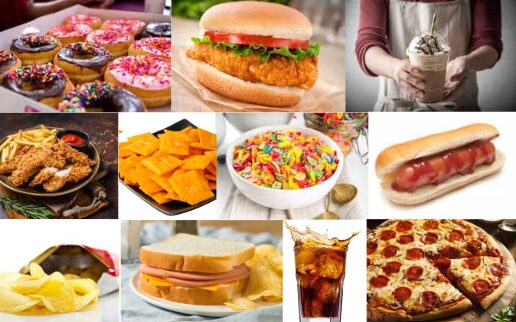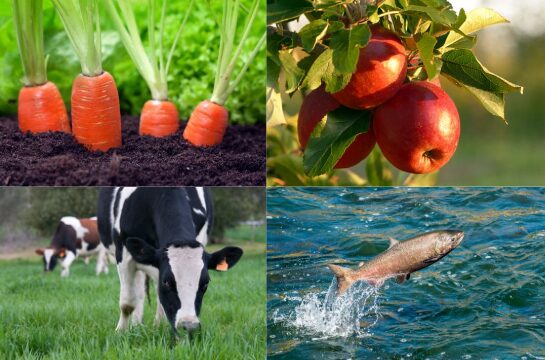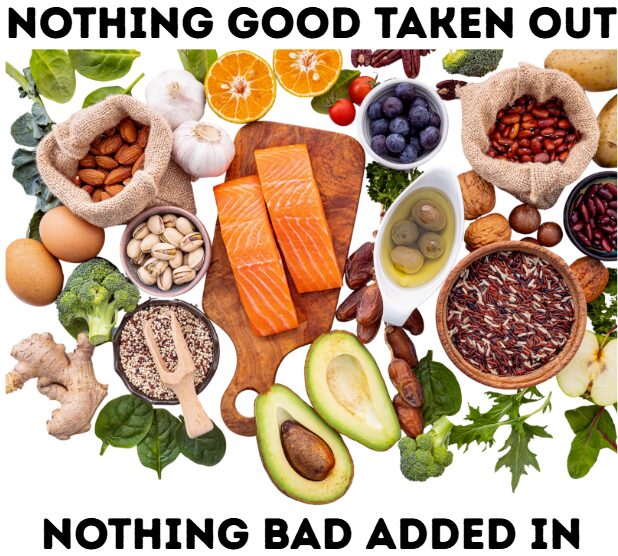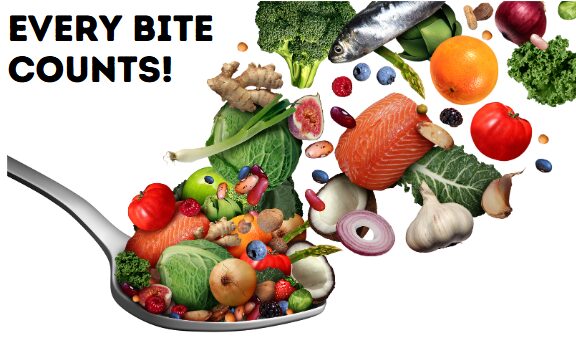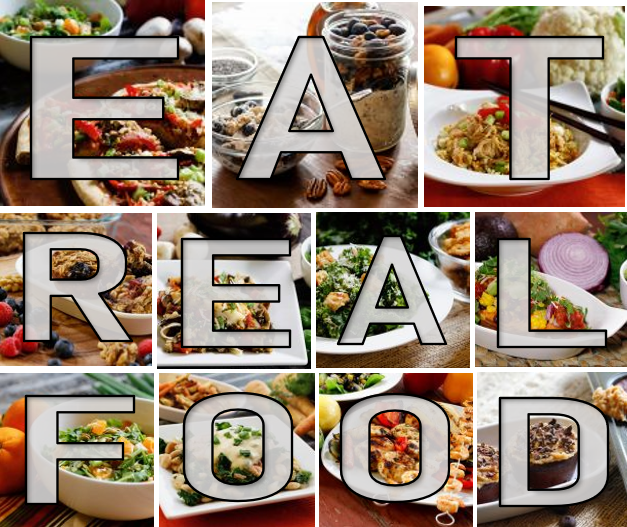When you hear someone say you should “eat real food” to be healthy, are you confused what this means? If so, you’re not alone!
Let’s talk about what exactly is REAL FOOD.
Here’s the reality. Most of what America eats is NOT REAL FOOD. The majority of what our country eats is ultra-processed foods (UPFs), which are made using industrial processes and long ingredient lists including flavorings, colorings, emulsifiers, sweeteners, thickeners and other substances.
This includes fast food, soft drinks, packaged snacks, chips, candy, cookies, cereals, breads, sauces, dressings and so much more. In the U.S., ultra-processed foods make up…
- more than 60% of calories consumed
- 67% of calories consumed by children
- 73% of calories on grocery store shelves
Real Food vs. Ultra-Processed Food: Key Differences
The definition of FOOD is “a nutritious substance that maintains life and growth and nourishes, sustains, and supplies.”
UPFs like cheese puffs, soda, Doritos, Skittles, Lucky Charms, Oreos, frozen waffles (just to name a few) do NOT maintain life and growth. Just the opposite, they actually shorten our life and harm us.
Because these edible food-like substances – that aren’t really FOOD – are so prevalent, that’s why we try to inspire everyone to find the joy and health and vitality that comes from REAL FOOD! Foods filled with nutrients that DO maintain life and growth.
Since giving a list of REAL FOODs is virtually impossible (there are so many of them!)…
2. As close to its whole natural state as possible
- Nothing bad added in:
- no artificial colors, flavors, sweeteners or preservatives
- no highly processed additives like MSG, hydrogenated oils or emulsifiers
- no chemical pesticides or hormones
- limited or minimal added sugars
- no mystery ingredients (anything you don’t recognize or can’t pronounce)
- Nothing good taken out:
- fiber, protein, healthy fats, and nutrients nature intended
- antioxidants, phytonutrients, vitamins and minerals are left intact
- bran and germ not stripped away from whole grains
3. Did it come from a farm or from a factory?

- Apples clearly came from a farm. Apple Jacks? From a factory.
- Corn comes from a farm. Doritos and Cheese Puffs? Of course, from a factory.
- Oats? From a farm. Oatmeal Cream Pies? They don’t grow from trees!
- Strawberries come from a farm. Strawberry Fruit Snacks? Factory.
4. Did God (or nature) make it? Or did man make it?
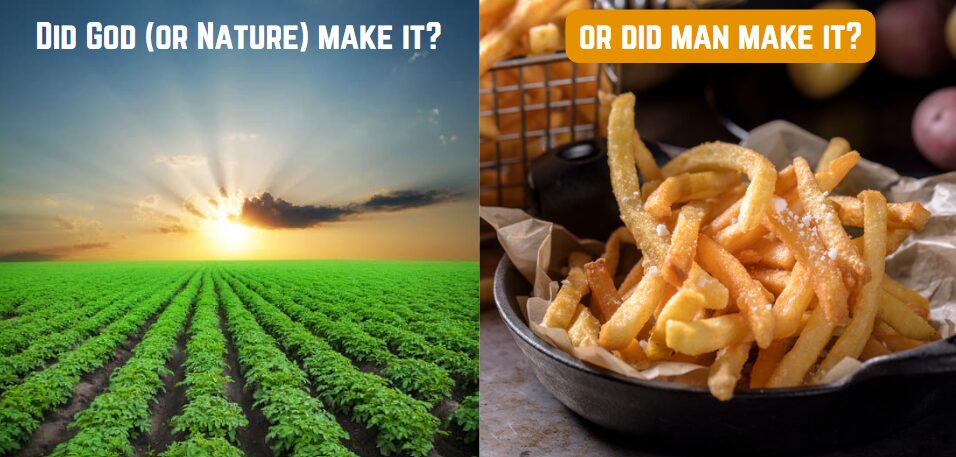
- Avocados = God (or nature). Avocado Ranch Salad Dressing = man.
- Blueberries = God (or nature). Blueberry GO GURT = man.
- Carrots = God (or nature). Carrot cake = man.
- Potatoes = God (or nature). French fries = man.
Obviously, there are variations to this. For example, peaches come from the farm, but canned peaches come from a factory. In this coaching tip on processed foods, we provide the four categories of processing from the NOVA food classification system if you are interested. The key is to focus on being as close to the farm as possible.
Fresh (when in season) and frozen (when not in season) will always be best. Canned peaches move a little further from the farm, especially depending on the ingredients. And then the frozen Lattice Peach Pie clearly moves off the REAL FOOD spectrum.
Examples of Real Food You Can Trust:
- Fruits and vegetables (leafy greens, cruciferous veggies, berries)
- Whole grains (brown rice, oats, quinoa)
- Wild-caught fish and pasture-raised meats and eggs
- Nuts and seeds (raw or dry roasted)
- Legumes (beans, lentils, chickpeas)
- Herbs and spices (fresh or dried)
Benefits of Real Food for Health & Well-Being
Every single bite you take is either providing nutrition, life and growth – or not.
The foods you eat are the building blocks for your cells that determine the functioning of your hormones, your brain, your microbiome, your metabolism, and your mood. They can either support high functioning, health and vitality or – especially with UPFs – they can create havoc, which can lead to all kinds of health issues that are so prevalent today.
Make the shift to a Real Food Diet
When you shift to REAL FOOD as the predominant part of your diet, you are literally days away from seeing changes. We have seen it time and time again – people noticing changes in as little as one to two weeks. Energy, brain fog, digestion, sleep, hormonal issues, mood. And much more!
One thing to be aware of. If you haven’t been eating a lot of high-fiber foods like vegetables and beans, you may notice some brief changes in your digestion. It is absolutely crucial to hang in there because this is your gut microbiome retraining itself.
You can read more about fiber digestive changes in our coaching tip or check out the book Fiber Fueled by Dr. Will Bulsiewicz. This book provides a fascinating look at the critical role of a diverse, plant-forward diet in cultivating a healthy microbiome. I often have a hard time getting through books written by doctors, but I couldn’t put this one down.
We encourage you to take a step back and assess how much of your food choices are REAL FOOD. We are here to provide inspiration and support to help you achieve your best health and vitality and it starts with the food on your plate.
 LEARN MORE ABOUT THE NAPKIN!
LEARN MORE ABOUT THE NAPKIN!
